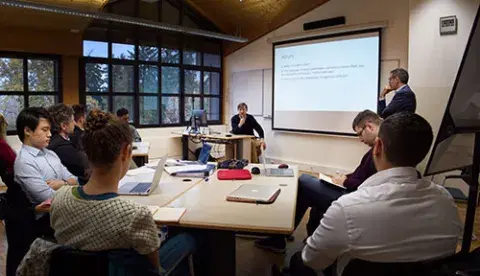
Franklin’s unique alliance with the United Nations Institute for Training and Research (UNITAR) is beginning to bear fruit.
This fall, as part of the Master’s program in International Management with an emphasis in Responsible Management and Climate Action, students are not only benefiting from the courses specifically designed to develop skills such as collaborative leadership, but they are also working with UNITAR to help implement the 2030 Agenda for Sustainable Development.
Over the last four days, they immersed themselves in a seminar on managing the 2030 Agenda for Sustainable Development taught by Jonas Haertle, Special Assistant to the Executive Director at UNITAR, Carlo Giardinetti, Dean of Executive Education and Global Outreach at Franklin, and Beat Stettler, former Quality and Sustainability Manager at Nestlè, with further presentations by Bérangère Magarinos-Ruchat, Global Head of Sustainability at Firmenich, and Heidi Huusko, Senior Manager for Government Affairs, Environment and Climate at UN Global Compact. A local young activist, Rebecca, was also present as an observer during the seminar.
As remarked by Haertle, “we live in privileged times, with information and data about challenges such as climate change or inequality available, and new solutions like collaborative leadership emerging. Now it’s time to act. I am confident that this seminar and the Master’s program as a whole will take students to reframe their actions.”
According to Corinne Young, Director of Graduate Studies at Franklin, “the MSIM learning environment is proving to be challenging, impactful, and transformational for our students and for the experts who are sharing their knowledge and experience. This program model is what is needed in today’s complex world.”
In spring 2020, MSIM students will work on an applied six-week capstone project mandated by an existing agency team at the UN that includes working between Lugano and Geneva, where many UN organizations and agencies are headquartered. As noted by Haertle, “they will be working on their own project with the supervision of UNITAR experts and actively participate with UN professionals and their partners to see how the challenges associated with the SDGs are approached. I am very much looking forward to seeing their final report on how the course work informs their final project and how the experience functions as a capstone to the entire MSIM experience.”

